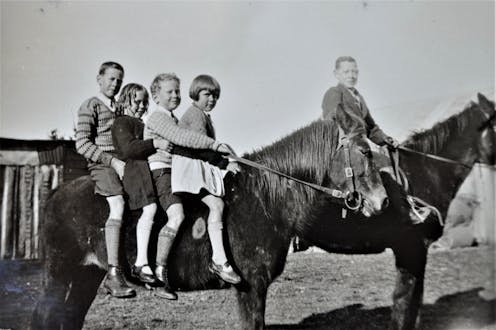Artificial intelligence may take your job. Some lessons from my grandmother
- Written by Bradley Hastings, Research Fellow, UNSW Sydney

My grandmother, Claire Hastings, was born in the 1920s on a farm in Armidale, northern New South Wales. That was a relatively common thing, with just 43% of the population[1] living in cities, compared with more than 70% now[2].
She lived in a small wooden hut, with a chicken coop out the front and fields out the back. When she and her siblings came home from school, they helped plough the fields with a horse-drawn plough until sundown.
Little did she know this life would soon disappear. The “second industrial revolution” (of mass production and standardisation) was creating machines to replace human and horse power. A plough pulled by a tractor could do in hours what took Grandma and her siblings a week.
By the time she left school, age 17, she wasn’t needed on the farm. So she instead went to college, became a teacher, got married and raised a family. Now 93, she lives in a comfy suburban four-bedroom home, enjoys dining at restaurants, and loves going to the theatre and on ocean cruises.
Her story is far from unique. Around the world industrialisation has reduced farm employment enormously. In the United States, for example, 40% of the labour force worked on farms in 1920; now it is about 2%[3]
The loss of those jobs, and their replacement, is worth remembering as we now confront the “fourth industrial revolution”, with robots and artificial intelligence tipped to take up to 40% of the jobs[4] now done by humans within two decades.
Read more: Behind those headlines. Why not to rely on claims robots threaten half our jobs[5]
The hit list is long[6], from drivers and call-centre workers to computer programmers and university lecturers like myself (we face being replaced by AI avatars, delivering animated content online).
But just as disappearing farm jobs didn’t lead to permanent mass unemployment, nor should we fear this next stage of technological development.
Improving quality of life
While industrial farming was not universally embraced as progress, the huge reductions in farming labour over the 20th century were key to a better life for most people (though poverty and glaring economic inequality still exist).
To cite just one measure, when my grandmother was born the average life expectancy in Australia was 60 years. Now it’s more than 80[7].
The underlying forces driving such advances are twofold.
First, the mechanisation of farming made food cheaper. US data[8] shows the price of a common basket of groceries is now about 80% cheaper than a century ago. Similar trends exist for virtually every other consumable product.
Second, spending less on food meant people could spend more on other things. New industries sprang up – automobiles, holidays, health care, finance, fitness and education and so on. Sectors virtually unknown in the 1920s now employ more than half of the population[9].

















